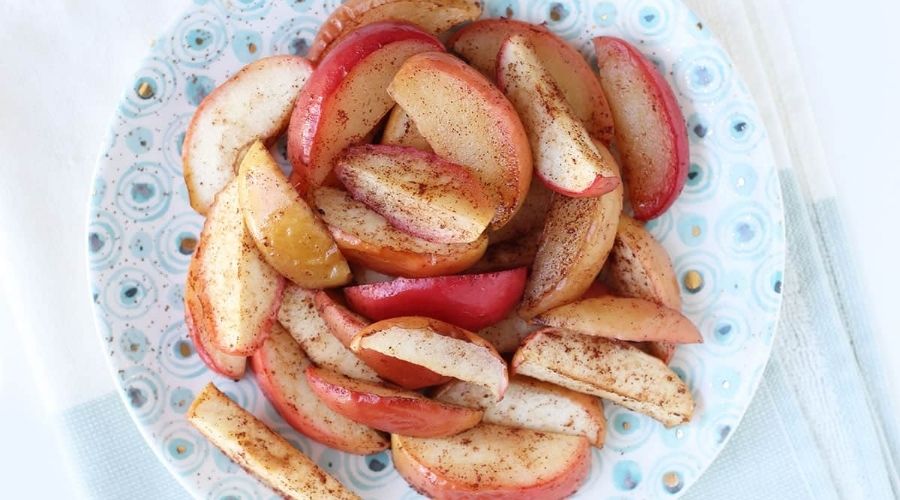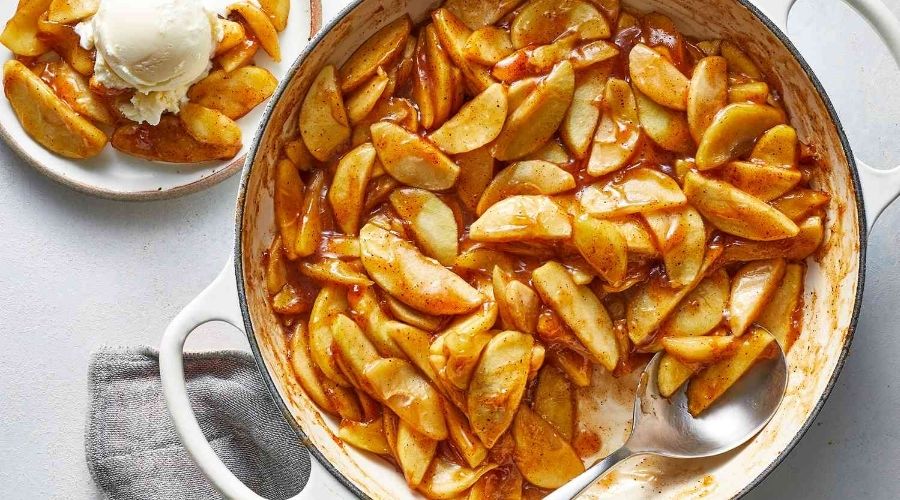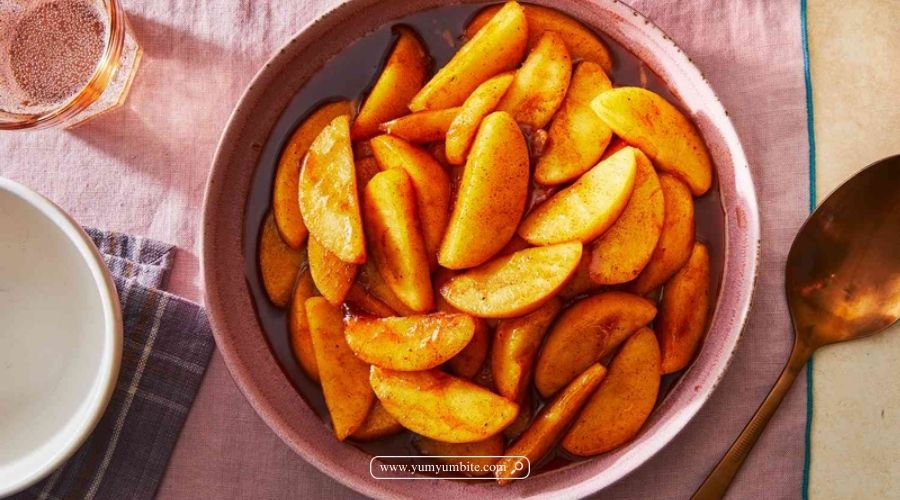Cooked apples are a delicious and versatile ingredient, whether used for pies, sauces, or simply enjoyed on their own.
But what do you do when you have leftovers or want to prepare them ahead of time?
Learning how to store cooked apples properly is essential to keep their flavor, texture, and freshness intact for future use.
In this guide, we’ll walk you through the best methods for storing cooked apples, ensuring they stay just as tasty as the day you made them.
Why Storing Cooked Apples Properly Matters
Storing cooked apples properly is crucial for maintaining their quality and ensuring they remain safe to eat. Here are a few key reasons why proper storage matters:
- Preserves Freshness and Flavor: Apples are naturally prone to oxidation and can become mushy or lose their sweet taste if not stored correctly. Proper storage methods help retain their flavor, texture, and color, so they taste just as fresh as when they were first cooked.
- Prevents Spoilage: Cooked apples, like other perishable foods, can spoil quickly if left out or stored improperly. By keeping them in the fridge or freezer, you prevent bacteria from growing, ensuring they stay safe for consumption.
- Reduces Waste: Storing your cooked apples properly means you can extend their shelf life, reducing food waste. Whether you have leftovers or want to prep apples ahead for future recipes, proper storage means you won’t have to throw away spoiled fruit.
- Versatility for Future Use: Properly stored apples can be used in various dishes at a later time. Whether you freeze them for long-term use or refrigerate them for short-term, having stored apples on hand gives you the flexibility to quickly whip up pies, sauces, or toppings when needed.
In essence, storing cooked apples the right way ensures you enjoy their full flavor, keeps them safe to eat, and minimizes waste, making the most of your culinary efforts.
How to Store Cooked Apples: A Complete Guide

Cooked apples are delicious on their own or as part of recipes like pies, crisps, and sauces.
Whether you have leftovers or want to prepare apples in advance, proper storage is key to preserving their freshness, flavor, and texture.
This comprehensive guide will walk you through everything you need to know about how to store cooked apples, so you can enjoy them for days or even weeks after cooking.
Let the Cooked Apples Cool Down Completely
Before storing your cooked apples, it’s crucial to let them cool completely. Storing warm apples can cause condensation, which may lead to bacterial growth and spoilage.
Here’s how to do it:
- Spread them out: Place the cooked apples on a baking sheet or in a shallow dish to allow them to cool faster.
- Let them breathe: If you’re cooling apples in a bowl or pot, leave it uncovered until they’ve cooled down to room temperature.
Short-Term Storage: Refrigerating Cooked Apples
If you plan on using your cooked apples within the next few days, storing them in the refrigerator is the best option.
Here’s how to do it:
- Step 1: Choose an airtight container: Use a container with a tight-fitting lid, or seal your apples in a zip-lock bag. This will prevent exposure to air, which can dry out the apples or cause spoilage.
- Step 2: Label the container: Make sure to label the container with the date you cooked the apples, so you know how long they’ve been stored.
- Step 3: Store in the fridge: Cooked apples can last for up to 5 days in the refrigerator when stored properly.
Tip: Add a light sprinkle of lemon juice to your cooked apples before refrigerating to prevent browning and preserve their vibrant color.
Long-Term Storage: Freezing Cooked Apples
If you have a large batch of cooked apples and want to store them for a longer period, freezing is the best method.
Here’s how to freeze cooked apples correctly:
- Step 1: Use freezer-safe containers: Choose freezer-safe, airtight containers or resealable freezer bags.
- Step 2: Pre-freeze the apples (optional): For best results, spread the cooled apples out on a baking sheet lined with parchment paper and freeze them for a couple of hours before transferring to containers. This prevents the apples from sticking together.
- Step 3: Store in batches: Divide the apples into smaller portions so you can thaw only what you need without wasting any.
- Step 4: Label and date: Clearly mark each container or bag with the date, and store the apples in the freezer for up to 6 months.
Tip: Thaw frozen cooked apples by leaving them in the refrigerator overnight or using the defrost setting on your microwave.
How to Store Apples in Syrup or Sauce
Cooked apples that are part of a syrup or sauce can be stored similarly, but with a few extra precautions:
- Refrigeration: Place the apple sauce or syrup in a sealed container and refrigerate. It will stay fresh for up to a week.
- Freezing: If freezing apple sauce or apples in syrup, be sure to leave some space at the top of the container, as liquids expand when frozen.
Avoiding Common Mistakes in Storing Cooked Apples
To keep your cooked apples as fresh as possible, avoid these common mistakes:
- Storing while warm: Never store hot or warm apples. This will cause condensation, leading to sogginess and spoilage.
- Using improper containers: Make sure to use airtight containers or bags designed for the fridge or freezer.
- Not labeling: Always label your containers with the date to avoid keeping apples longer than recommended.
How to Use Stored Cooked Apples
Once stored, cooked apples can be used in a variety of ways:
- Refrigerated apples can be reheated and enjoyed as a quick dessert topping, added to oatmeal, or stirred into yogurt.
- Frozen apples can be thawed and used in pies, crumbles, or smoothies.
Storing cooked apples properly is an essential step to preserving their taste, texture, and quality.
Whether you’re refrigerating them for a few days or freezing them for months, following the steps in this guide will ensure your apples remain fresh and ready to enjoy whenever you need them.
From breakfast toppings to dessert fillings, properly stored cooked apples are a versatile ingredient that can enhance many dishes.
What to Look for While Storing Cooked Apples
When storing cooked apples, there are several key factors to consider to ensure they stay fresh and safe to eat. Here’s what to look for:
Cooling Before Storage
Make sure the cooked apples are completely cooled to room temperature before storing. This prevents condensation, which can lead to spoilage.
Airtight Containers
Use airtight containers or resealable bags to minimize air exposure. This helps keep the apples fresh and prevents them from absorbing unwanted odors from the fridge or freezer.
Portion Sizes
If you have a large batch, consider dividing the apples into smaller portions. This makes it easier to thaw only what you need, reducing waste and maintaining quality.
Labels and Dates
Clearly label each container or bag with the date of storage. This will help you keep track of how long the cooked apples have been stored, ensuring you use them within the recommended time frame.
Check for Damage
Before storing, look for any bruised or damaged apples. Remove any spoiled pieces to prevent them from affecting the rest of the batch.
Additives for Preservation
If you haven’t already, a light sprinkle of lemon juice can help preserve the color and prevent browning, especially for apples stored in the refrigerator.
Storage Environment
Store cooked apples in a consistent temperature environment. In the refrigerator, they should be kept at or below 40°F (4°C), while frozen apples should be at 0°F (-18°C) or lower.
By keeping these factors in mind, you can ensure that your cooked apples remain delicious, safe, and ready to enjoy whenever you need them!
How to Tell If Cooked Apples Are Bad After Storing

While proper storage can extend the shelf life of cooked apples, they will eventually spoil.
Knowing the signs of spoilage is important to avoid consuming apples that are no longer safe to eat. Here’s how to tell if your cooked apples have gone bad after storing:
1. Unpleasant Odor
Freshly cooked apples have a sweet, fruity smell. If you detect an off or sour odor, it’s a clear sign that the apples have started to spoil.
Any musty or fermented smell also indicates that the apples are no longer good to eat.
2. Discoloration
While some browning is normal due to oxidation, especially if the apples were not treated with lemon juice or another acid, excessive discoloration can be a warning sign.
If the apples have turned dark brown or developed mold spots, they should be discarded.
3. Mold Growth
Visible mold is a strong indicator that your cooked apples have gone bad. If you see any fuzzy or discolored patches, such as green, black, or white spots, the apples are no longer safe to consume.
4. Slimy Texture
Cooked apples should remain soft and tender, but if they develop a slimy or sticky texture, it’s a sign of bacterial growth and spoilage.
Sliminess often occurs when food has been stored for too long or has not been kept at the proper temperature.
5. Sour or Fermented Taste
If the apples smell or look fine but have a sour, fermented, or off taste, they’ve likely spoiled.
Even if only part of the batch tastes bad, it’s safer to discard the entire portion rather than risk foodborne illness.
6. Extended Storage Time
Even if your cooked apples don’t show obvious signs of spoilage, it’s important to consider how long they’ve been stored. Cooked apples typically last:
- In the refrigerator: Up to 5 days
- In the freezer: Up to 6 months
If your apples have been stored longer than these guidelines, it’s best to discard them, as they may have degraded in quality even without visible signs of spoilage.
Final Tip: Trust Your Senses
Always trust your senses when determining if stored cooked apples are safe to eat. If something smells, looks, or tastes off, it’s better to err on the side of caution and discard them.
1. Can I store cooked apples in the fridge?
Yes, you can store cooked apples in the refrigerator. Place them in an airtight container or a sealed zip-lock bag to prevent them from drying out or absorbing odors. Cooked apples can last up to 5 days in the fridge if stored properly.
2. How long can I keep cooked apples in the freezer?
Cooked apples can be stored in the freezer for up to 6 months. Make sure to use freezer-safe containers or bags and label them with the date.
Pre-freezing the apples on a baking sheet before transferring them to containers can help prevent them from clumping together.
3. Do I need to add lemon juice before storing cooked apples?
While adding lemon juice isn’t mandatory, it’s recommended to help preserve the color of your cooked apples, especially when storing them in the fridge.
A light sprinkle of lemon juice prevents oxidation, which can cause browning.
4. Can I reheat stored cooked apples?
Yes, you can reheat stored cooked apples. If they were refrigerated, gently warm them on the stovetop or in the microwave.
If frozen, thaw them in the fridge overnight or use the microwave’s defrost setting before reheating.
5. How can I tell if my stored cooked apples have gone bad?
Spoiled cooked apples often have an off or sour odor, visible mold, excessive discoloration, or a slimy texture.
If you notice any of these signs, it’s best to discard them. Always check for these indicators before consuming stored cooked apples.
Conclusion
Storing cooked apples the right way allows you to enjoy their sweet, tender goodness whenever you need them, without sacrificing flavor or texture.
By following the tips in this guide, you’ll be able to extend the shelf life of your cooked apples, whether you’re freezing them for future use or keeping them fresh in the fridge.
With proper storage techniques, those delicious apple treats will always be ready for your next dish or dessert!
References
- https://realfood.tesco.com/article/how-to-store-and-freeze/how-to-freeze-and-store-apples.html
- https://www.realsimple.com/food-recipes/shopping-storing/food/how-to-store-apples
- https://www.gardenersworld.com/how-to/grow-plants/how-to-store-apples/
- https://www.quora.com/What-is-the-best-way-to-store-apples-at-home
- https://www.reddit.com/r/homestead/comments/10lxoxx/tips_from_the_1700s_on_how_to_keep_whole_apples/


